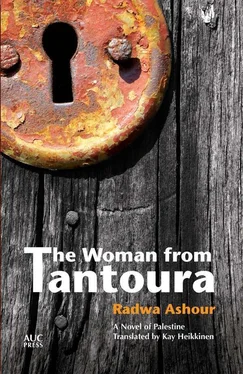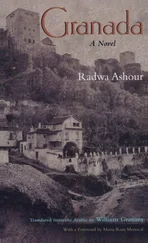All alone the almond tree ruled over spring in the village, the undisputed queen. None of the surrounding trees dared to contest it. Even the sea was jealous of the almond tree in the spring, even the sea foam was jealous, for what was its poor white compared to a heart like a carnation, taking one stealthily to a frank crimson? The almonds flower and steal our hearts, and then they capture them entirely with their delicate, deceptive fruit, stinging and sweet. We don’t wait for it to harden, we stretch our hands to pick what’s close. We climb the branches and take what we want. We eat in the trees or carry it as provisions in our pockets, or lift the ends of our garments to hold them, and then fly home.
My mother says, “February can’t be tied down.” She says, “February is fickle and stubborn, it huffs and puffs and has the smell of summer.” The winds are active and the waves high and the cold still lingers, cutting to the bone as if we were in the depths of winter, but we know that March is only two steps away. Then the almond flowers, as if opening the way and giving permission, followed by the apricot blossoms, and afterward the trees are covered as they rush to compete, first with their flowers and then with the early fruit. Then we know that April has planted its feet on the earth, and that May will follow it, to set the wheat on the threshing floors and the fruit on the trees.
So why did they choose these four months for war, for strikes, and for killing people without number?
I didn’t know all the details, what happened in Haifa on any given day, how many were killed by the powder barrel the settlers rolled down Mount Carmel on such-and-such a street, or in what village they invaded the houses by night, pouring kerosene on the stores of flour and lentils and oil and olives, firing on the inhabitants. But like the rest of the girls in town I knew that the situation was dangerous, not only because we heard some of what went from mouth to mouth, but also because there was something frightening in the air, something on the verge. On the verge of what? We didn’t know. The madafa that served as a town hall for the men was almost never without meetings, where they would stay until late at night. Sometimes my father would wake us, asking us to prepare something to eat and a bed for guests, saying, “It’s late, they will spend the night with us. Offer them whatever there was for supper, and get up early in the morning to prepare breakfast because they are traveling.” So we would make a quick supper and prepare a bed, and get up early in the morning to make breakfast for the men who were traveling.
My father and the men of the village must have known about the partition resolution when it happened, and in those meetings of theirs they were making their arrangements to confront it. (The coastline from south of Acre to south of Jaffa, including our village, was included in the Jewish state after the partition.) But I don’t remember that I heard about it or that the topic was brought up among the women of the village, or among the girls like me. The first news that alerted me was what happened in Haifa at the end of the month of December, since one of the neighbors told my mother about fights in Haifa between the Jewish and Arab workers in the oil refinery. The neighbor said that the Jews threw a bomb from a fast-moving car and killed and wounded many of us. She said that on the very next day the Palestinian workers rose against the Jewish workers, armed with sticks and knives, taking vengeance and killing anyone they could. Before dawn the Jewish soldiers attacked Balad al-Sheikh and a neighborhood on its heights where the refinery workers from Ijzim and Ain Ghazal and other neighboring villages lived with their wives and children. They descended on the residents with axes and knives and bombs and rifles, and left behind them corpses everywhere. Some say they killed sixty residents and some say that hundreds were killed.
My mother got up hurriedly and I followed her. She went to the house of the headman and asked me to go into the madafa and call my father. He came.
“What is it, Umm Sadiq?”
“Have you heard about what happened in Haifa?”
“I heard.”
“Aren’t you going to go to see your boys?”
“God protect them, if one of them had been hit we would have heard the news from a hundred sources. Be calm. What happened, happened in the oil refinery, and it’s far from where they live and from the school and the bank. Go home, women don’t come to the madafa like this to talk to the men at the door!”
“But the boys …”
He cut her off. “The boys are fine, God willing, and they’ll come at the end of the week. And if they can’t come because of the situation, they’ll come at the end of the week after.”
We went home. My mother was crying and saying over and over, “O Lord, O Lord, protect her and me and my boys and deliver them, O Almighty, O Munificent.” Her voice would choke in tears and then rise in lament: “ Yaammaa , apples of my eye, they’re shooting at you so far away and nobody even knows, yaammaa , oh my beloveds!” I shouted at her, “Your weeping is a bad omen, Mama. It’s forbidden! Our Lord will be angry with you and afflict them tomorrow with what spared them today.” I said it in a decisive tone, as if I were scolding her. The words stuck in her mind and she calmed down, and then turned toward the sky and said, “Forgive me O Lord, I’m not opposing your decree. Protect Sadiq and Hasan, restore them and bring them home safe and sound from distant lands. Be kind to us, O Lord.” It was as if God had heard her and shut the door as she finished speaking, and she considered it an agreement. She looked at me suddenly, as if she had finally realized that I was walking beside her, and said, “By God, by God, I will not give you to the boy from Ain Ghazal if he doesn’t promise to live far away from Haifa. We’ll record the condition in the marriage contract!”
While we waited for Thursday my mother hid her fears in her breast, afraid to break the implicit agreement between her and the Most High, as if what I had said about the omen was not from my own mind but rather an inspiration from Him, telling her His will and conditions. The poor thing kept the conditions and followed the path with determination, not crying or complaining or referring to the subject, just growing paler day by day. When Abu Isam’s bus returned from Haifa the tears began to flow silently from her eyes. Then a boy came from the direction of the highway, bringing her good news and saying that they had arrived in a car that left them at the entrance to the village, at the place we called “the Gate.” “I saw them with my own eyes.” My mother got up, washed her face and changed her dress and went out to the courtyard of the house. My father joined her. She saw them coming from afar but she stayed calm, as if she were waiting until she could be certain beyond any doubt. When they came within two steps of her, so that her hand could touch them, she let out a ringing trill of joy — at which my father slapped her face with his hand, a resounding slap followed by a shout of anger, “Have some shame, woman! A hundred men were martyred in one week and you are trilling!” Silence fell, all movement stopped. My brothers stopped walking, I was nailed to the ground. My mother seemed thrown into confusion, not knowing what to do about the first slap she had ever received from her cousin. Then the scene resumed: my brothers began walking toward the house. They kissed their father’s hand before moving to their mother’s arms, waiting to enfold them.
My father said, “Come with me to the madafa, to give the men the news from Haifa.”
My mother asked, whispering, “And supper?”
My father asked, “Are you hungry?”
Читать дальше












